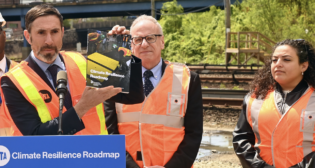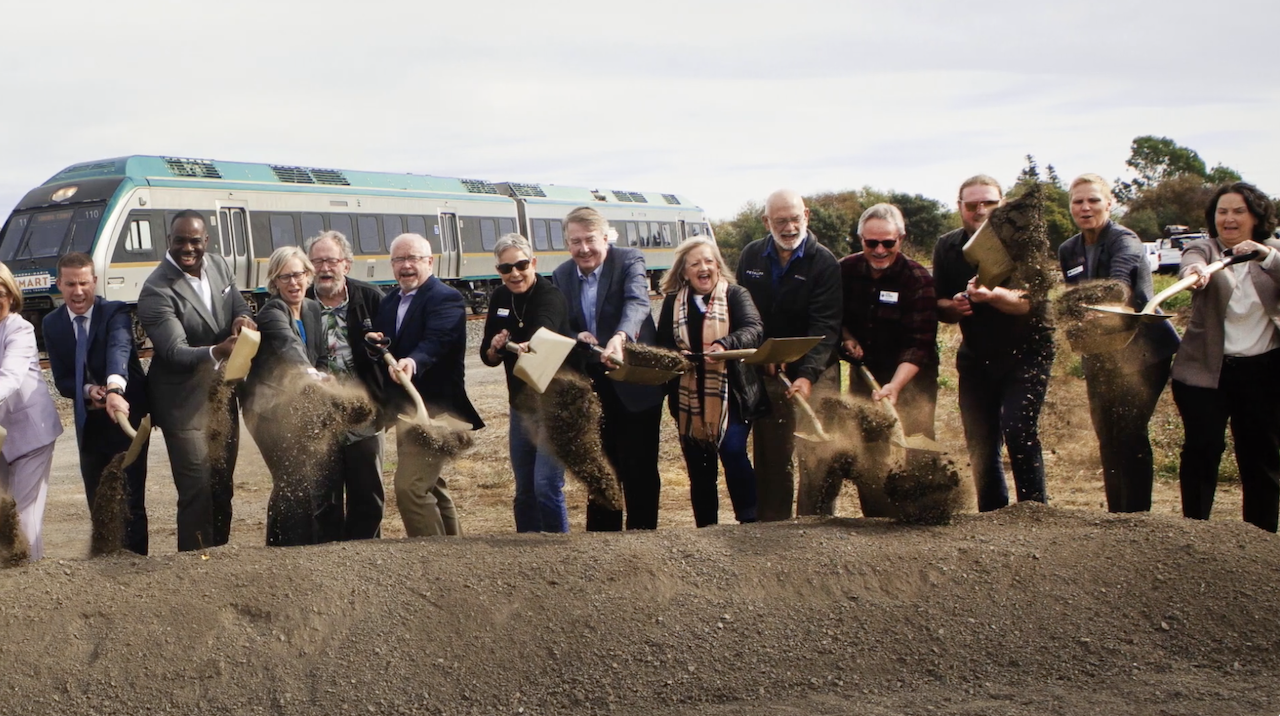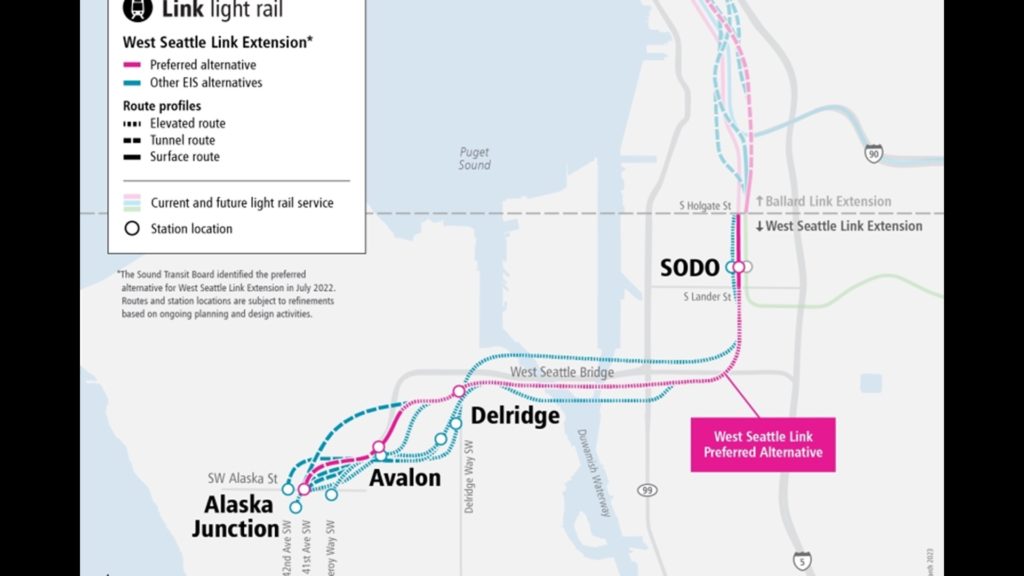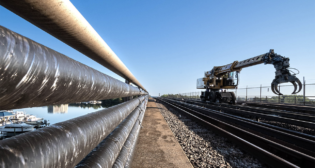
Transit Briefs: SMART, Sound Transit, Project Connect, SEPTA, CTA
Written by Carolina Worrell, Senior Editor
Screenshot Courtesy of SMART, via YouTube
Sonoma-Marin Area Rail Transit (SMART) celebrates the groundbreaking of its Petaluma North Station. Also, Sound Transit expects to finish the planning phase for its West Seattle Light Rail Extension in 2024; Project Connect expects to wrap its initial light rail environmental review by next fall; Southeastern Pennsylvania Transportation Authority (SEPTA) Transit Police vote to strike after rejecting the latest contract from the agency; and the Chicago Transit Authority (CTA) introduces “Innovation Studio” to address public transit challenges.
SMART
Hundreds of community members on Nov. 9 attended the groundbreaking for SMART’s Petaluma North Station.
This long-awaited second SMART station in Petaluma, the agency says, “represents our commitment to sustainability, enhanced mobility, and environmental responsibility, underscoring our dedication to a greener future.”
The Petaluma North Station, which will feature vehicle and bicycle parking, also includes construction of a three-mile segment of the SMART Pathway, which is part of the Great Redwood Trail. The pathway will provide a link between Downtown Petaluma and Main Street Penngrove, enhancing bicycle and pedestrian connectivity in the area. In addition to its transportation benefits, the project, SMART says, will also support 131 new affordable housing units adjacent to the station.
Construction of the station and pathway is projected to be completed in late 2024. The construction will be led by a joint venture of Stacy and Witbeck, Inc./Ghilotti Brothers, Inc.
“It was a great day celebrating this exciting milestone as we work towards a brighter and more sustainable future for Petaluma and the entire North Bay,” the agency said.
Sound Transit
The planning phase for Sound Transit’s proposed West Seattle Link Extension is expected to be completed next year, according to a KING 5 report.
Approved by voters in 2016, the West Seattle Link Extension, according to the report, has increased in price from $2.3 billion to just under $4 billion. Service is also scheduled to start two years later than anticipated. “Despite setbacks and community pushback, Sound Transit is moving forward on a project that’s one of the biggest, if not the biggest, investments in transportation in the region’s history,” KING 5 reported.
According to Sound Transit, the West Seattle Link Extension will “provide fast, reliable light rail connections to dense residential and job centers in the SODO, Delridge and West Seattle neighborhoods.”

Sound Transit, KING 5 reports, expects hundreds of people will be displaced, with homes and businesses being demolished to make way for the Link extension. A spokesperson for the agency provided this link that goes over the displacement.
Rethink the Link, a group pushing for sound transit to select a no-build option, is “concerned about the impact on the community,” according to the report. “The group also thinks the price tag of $4 billion could be better spent improving other forms of transportation already being used in West Seattle.”
“Life, in general, costs a lot of money, so if I can take the light rail and save some money, I wouldn’t be mad about it,” one commuter said, according to the KING 5 report.
Sound Transit is asking for feedback from the community on its proposal. The Station Planning Survey can be found at this link.
Project Connect
Project Connect leaders on Dec. 13 outlined the next year of project development as the program’s light rail system “progresses through federal processes and review,” according to a KXAN report.
Austin Transit Partnership (ATP) Executive Director Greg Canally said during a board meeting on Wednesday that the organization is “continuing work on the National Environmental Policy Act (NEPA) process for the initial phase of light rail.” That process, KXAN reports, is a comprehensive environmental review of the planned work and is required for any project that incorporates federal funding.
According to the report, for Project Connect’s light rail plan, the NEPA process will “evaluate all the potential impacts due to both the construction and operations of the light rail, as well as ways to try and mitigate said impacts.” Analysis areas include effects on biological and natural resources, neighborhoods, and socio-economic impacts as well as both cultural and historical ones, KXAN reported.
ATP Executive Vice President of Planning, Community and Federal Programs Jennifer Pyne said ATP will “launch a series of public meetings and community engagement events in early 2024 to explain to community members the light rail program’s current status and what’s being evaluated as part of the NEPA process.”
According to the KXAN report, in January and February, ATP will “highlight items poised to undergo environmental review, as well as gather feedback, input and questions from community members.” Between April and June, the organization will host educational and informational outreach events that home in on the environmental analysis and project development process.
From there, KXAN reports, ATP staff will gather feedback that will factor into a Draft Environmental Impact Statement (DEIS).
Next fall, according to the report, there will be an opportunity for the public to read and weigh in on the DEIS. ATP officials told KXAN a final EIS and record of decision related to phase one of light rail development is expected to be released in fall 2025.
Outside of the NEPA process, ATP is also working with the Federal Transit Administration (FTA) to try and secure federal dollars for the light rail system. That process, according to the report, is expected to take roughly two years to finish, ATP officials told KXAN back in September.
“The ways that we can maximize our grant dollars include just designing the project to really enhance ridership, to make sure that we’re providing the best possible transit project for this community,” Pyne said during a September interview.
SEPTA
SEPTA Transit Police on Dec. 13 voted to go on strike after rejecting the latest contract offer from SEPTA, according to a CBS news report.
According to the report, the Fraternal Order of Transit Police (FOTP) Lodge 109, the union representing SEPTA’s officers, “voted overwhelmingly against SEPTA’s latest offer on Wednesday night after contract talks ended Tuesday without an agreement.”
Two-thirds of transit police officers voted to reject the contract, and the strike became effective immediately.
“Instead of walking the beat and patrolling public transit, we will be walking the picket line,” said FOTP President Omari Bervine, who is a SEPTA patrol officer, in a release. “SEPTA has devalued their patrol officers. This vote shows our members are tired of being shortchanged. We deserve comparable wages and terms to what bus drivers and other transit workers received.”
Initially, according to the CBS report, SEPTA Transit Police planned to go on strike in November, but they pushed back the deadline until this week. Union members have been working without a contract since March.
The FOTP represents more than 170 police officers who patrol SEPTA’s stations and buses, subways, trains and trolleys. The union says transit police is currently “staffed at 25% below its budgeted headcount due to the inability to retain staff and recruit new officers,” according to the report.
According to the report, the union says SEPTA’s Transit Police are paid “considerably lower” than police at Amtrak and Temple University, among others. They also claim SEPTA police officers have recently left to seek higher-paying jobs.
The union, CBS reports, came to an agreement with SEPTA over wages and benefits, but the terms of the contract held up negotiations, which led to the strike.
FOTP Lodge 109 Vice President Troy Parham claims the FOTP is “still waiting to see a three-year deal offer, even though a SEPTA spokesperson said they offered the three-year term,” according to the report. SEPTA’s most recent deal is 43 months, but the union rejected the contract, Parham said.
According to the CBS report, it’s unclear when the FOTP and SEPTA will begin negotiating again, but Parham said, “they’ll start talking whenever SEPTA is ready.”
CTA
The Chicago Transit Board on Dec. 13 authorized the creation of “Innovation Studio,” a CTA program that the agency says, will “solicit ideas from the private sector for innovative solutions for improving the customer experience, enhance operations and address safety and security challenges.”
With the creation of the Innovation Studio, CTA says it will now be able to quickly partner with companies to test selected solutions on the transit system.
“Public transit helped shape and build our incredible city as we know it today, and to ensure we remain relevant and central to its future, we must be able to adapt quickly to the ever-changing technologies driving our daily lives,” said CTA President Dorval R. Carter, Jr. “The creation of the Innovation Studio will help accelerate our efforts to solve difficult problems impacting the agency and offer new means of improving the transit experience for our customers.”
Through the Innovation Studio, CTA will release several problem statements, which will be developed based on feedback from employees and customers that identify specific challenges it and its customers are facing. Companies will then submit their proposals for innovative pilots or proof of concepts (POCs) that they believe will address the rider challenges and improve internal operations.
According to CTA, an internal review panel consisting of representatives from a variety of the agency’s departments will evaluate the proposals for feasibility, scalability and innovation. Once the pilots and POCs are selected, CTA will work closely with the vendors to develop, launch and evaluate pilots and POCs on the transit system for up to one year. Based on the successful completion of the various pilots, CTA will determine next steps, potentially including issuing a formal procurement to deploy the technology on a wider scale.
The Innovation Studio, the agency says, will help CTA to “incorporate cutting-edge technology and process improvements across the agency to enhance the customer experience and increase operational efficiency.” There have been similar programs that have been successful at other peer transit agencies, including New York Metropolitan Transportation Authority’s (MTA) Transit Innovation Partnership and the Massachusetts Bay Transportation Authority’s (MBTA) Innovation Proposals.
Beginning in January 2024, CTA will work with its partners to develop the problem statements, provide additional information on the CTA website about Innovation Studio and host an information session for interested companies. CTA says it anticipates announcing the studio’s first pilots and POCs in June 2024.



